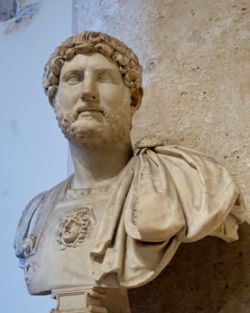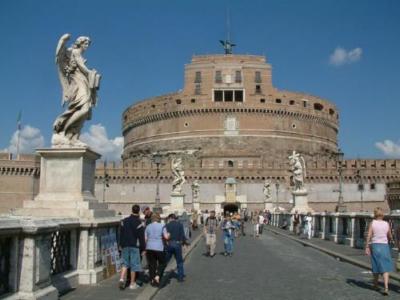 SKC Films Library SKC Films Library |
| SKC Films Library >> General and Old World History >> Italy >> Empire, 27 B.C. - 476 A.D. |
| Hadrian Roman Emperor, 117-138
Publius Aelius Hadrianus was born on January 24, 76, probably in modern-day Spain. His father, P. Aelius Afer, was a praetor; his mother, Domitia Paulina, came from a distinguished family of Gades, one of the wealthiest cities in the empire. When his father died in 85/86, Hadrian came under the guardianship of his father's cousin, Trajan, who became Emperor in 97. Hadrian spent thirty years of his life as a public official and military officer, with most of his time spent in the easternmost reaches of the Empire. In 100, he married Trajan's grand-niece, Vibia Sabina; the marriage was never a happy one and produced no children. By the time of Trajan's death he had become legate of the province of Syria, with personal responsibility for securing the east following the Parthian War. Emperor Trajan died on August 8, 117, after supposedly adopting Hadrian and declaring him his successor. The army of Syria proclaimed Hadrian Emperor on August 11, making formal recognition by the Roman Senate a mere formality. The new Emperor spent several months touring and securing the eastern reaches of the Empire before making his way to Rome and taking the official title Imperator Caesar Traianus Hadrianus Augustus. Hadrian's reign was generally peaceful, as he ended the war with Parthia almost immediately upon his accession and returned all Parthian territory that Rome had previously won. The only real threat to his reign came when the Jews in Palestine revolted in 132, following Hadrian's erection of a Roman temple in Jerusalem; the revolt was crushed in 135. Major accomplishments of his reign included establishment of a single, uniform legal code throughout the Empire and the creation of an empire-wide communications system. Defensive fortifications were erected throughout the Empire, including a stone wall near the modern border of England and Scotland (now known as Hadrian's Wall). Two new cities were founded by Hadrian -- Antinoopolis (Egypt) and Hadrianople (now Edirne, Turkey). An admirer of Greek culture, Hadrian completed the great temple of Zeus in Athens which had been begun in the 500's B.C., added a whole new quarter to Athens, and launched a building program at Delphi. He was also a patron of architecture, and was responsible for the Pantheon and the Castel Sant'-Angelo in Rome. Emperor Hadrian became ill in 136 and died on July 10, 138. He was succeeded by Titus Aurelius Antoninus (Antoninus Pius), whom he had adopted just before his death. He was interred in the Castel Sant'-Angelo.
PRINT SOURCE INTERNET SOURCE |
| SKC Films Library >> General and Old
World History >> Italy >> Empire, 27 B.C. - 476 A.D. This page was last updated on June 06, 2017. |

